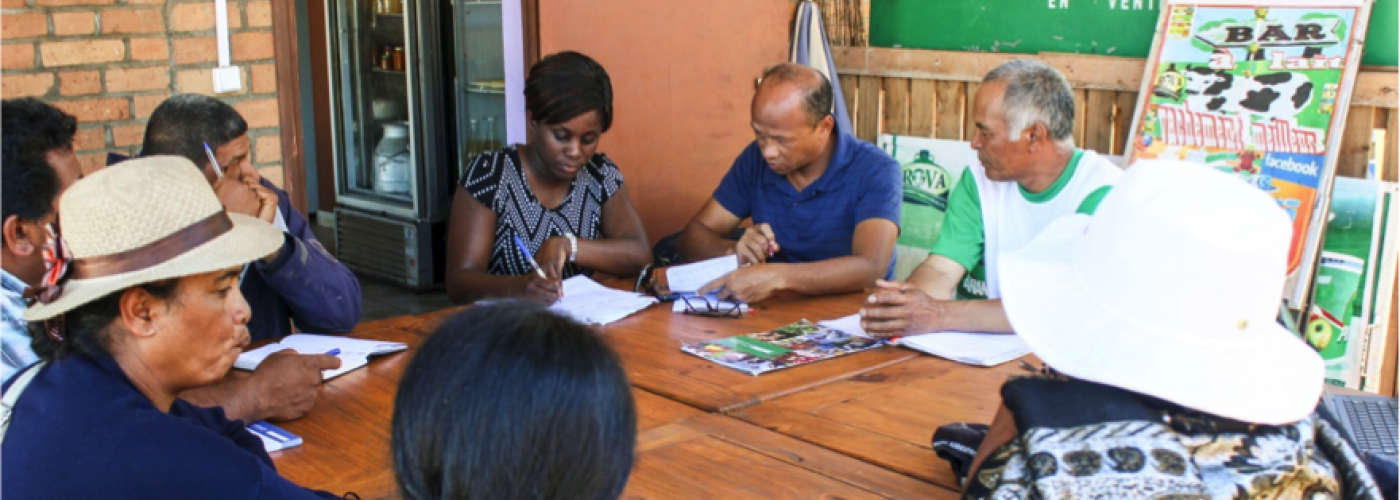Widening the Lane for Cooperative Development in Madagascar
Image

This is the eleventh post in the Cooperative Development Learning Series, which highlights learning from USAID’s Cooperative Development Program and was authored byVirginia Brown.
Click the links to read the first, second, third, fourth, fifth, sixth, seventh, eighth, ninth, and tenth posts.
Cooperatives can provide solutions in all areas of life, such as agriculture, health, finance, transportation, and tourism. To do so, an enabling legal framework must be put in place to allow cooperative businesses to grow and thrive. Through the USAID Cooperative Development Program (CDP), the National Cooperative Business Association CLUSA International (NCBA CLUSA) is aiding the Government of Madagascar — with critical support from the Ministry of Industry and Private Sector Development (MIDSP) — to do just this.
To help widen the lane for cooperative sector growth in Madagascar, NCBA CLUSA has teamed up with other cooperative development organizations — HealthPartners, World Council of Credit Unions (WOCCU), Madagascar consulting firm Finances Technologies Human Resources Management (FTHM), and international and local cooperative and legal experts — to develop a national strategy for cooperatives and provide recommendations for a revised cooperative law.
From January 22 to February 7, 2018, the project consortium conducted a cross-sectoral cooperative field assessment in multiple regions of the country and a cooperative stakeholders’ workshop with more than 100 participants to better understand the cooperative landscape, including the challenges and opportunities for cooperatives with a focus on agriculture, health, finance, and the interconnectivity among these sectors. By first speaking with cooperative leaders and members at the village level and then validating field-based findings at the workshop, organizers maximized participation of all stakeholders and generated buy-in for this process to improve the enabling environment.
To continue building ownership of the cooperative movement in Madagascar, NCBA CLUSA and partners conducted a second workshop July 19-20, 2018, to present their draft national strategy for cooperative development and gather feedback from cooperative stakeholders across sectors. Local partner FTHM is incorporating this feedback into a revised strategy document that will be submitted to the MIDSP this November.
At this workshop, NCBA CLUSA’s legal partners also presented the findings and recommendations from the cooperative law assessment so stakeholders could learn about the enabling elements of the law and the disabling features that should be revised to promote a more enabling legal framework for cooperative businesses. One disabling element of the law that has proved detrimental to cooperative development in Madagascar is the lack of a specific tax framework for cooperatives. Cooperative leaders and members who participated in the initial field assessment and stakeholder workshop complained bitterly about the unclear, unfair, and inconsistent tax system. Now that the root of the problem has become clear, project partners can begin to support government stakeholders as they develop an appropriate tax structure to include in the law revisions.
By using an inclusive and participatory cross-sectoral approach that engages cooperative stakeholders, from cooperative leaders and members to government officials, NCBA CLUSA and partners hope to promote an environment where effective cooperative development can be achieved in all areas of life. So far, this approach is building substantial momentum. Various ministries are collaborating through an inter-ministerial committee to oversee this process, and they are working directly with other stakeholders including the most important stakeholders of all: cooperative members.
Over the next few months, the project consortium will propose a revised national strategy and law revision recommendations to the government. NCBA CLUSA will also host a train-the-trainer cooperative foundations training to improve the capacity of government technicians and cooperative leaders to educate others on cooperative business management and governance.
By encouraging Madagascar’s cooperative stakeholders to take the driver’s seat and building their capacity to advocate for change, NCBA CLUSA and partners are helping to promote a locally-led, sustainable campaign for cooperative sector development in the country. After all, legal and regulatory reform is a marathon, not a sprint — and local champions will be needed to see this work to fruition.
Virginia Brown, Program Manager at NCBA CLUSA, has more than six years of international development experience. She manages NCBA CLUSA’s $4.8 million portfolio in Madagascar focused on cooperative development and value chain strengthening for crops including vanilla, fruits, and spices such as turmeric, cinnamon, ginger, and black and wild pepper. Brown also supports the organization’s cooperative development practice, Farmer-to-Farmer programming, and an International Finance Corporation (IFC)-funded project in Tanzania building capacity of producer organizations.


